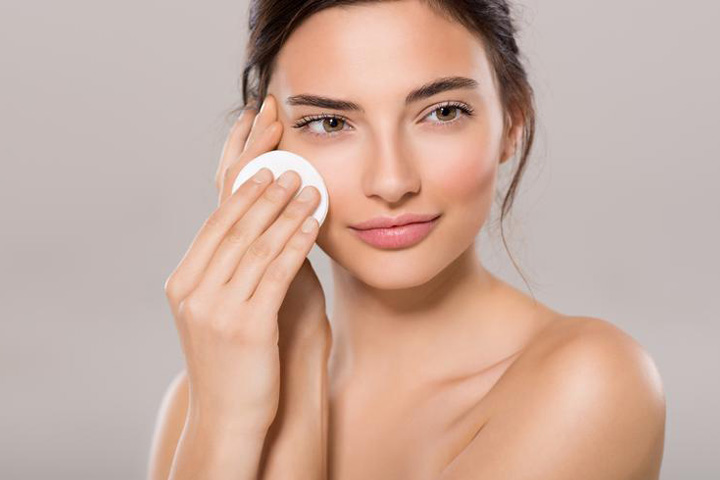Eight Benefits of Glycerine for Skin Care : Glycerine is one of the most valuable substances in the world and is found in a wide variety of everyday products. Due to its outstanding moisturizing properties, glycerine is commonly used in skin care products. Whether you only use natural skin care products or household brands, it’s highly likely you’ll find glycerine on labels throughout your home.
Glycerine may sound like a foreign chemical, but natural glycerine exists in all animal and vegetable matter. Glycerine has many uses and benefits when it comes to beauty and skin care, but not all glycerine products are created equal. In this post, we’ll explain how glycerine works wonders for skin, how you can add glycerine to your skin care routine and which type of glycerine to use for maximum benefits.
What Is Glycerine?
Glycerine, also often called glycerol or glycerin, is a colorless, odorless, syrupy liquid with a sweet flavor. In terms of chemical composition, glycerine is a trihydroxy sugar alcohol. The name glycerol comes from the Greek word “glykys,” which means “sweet.”
Glycerine can be natural or synthetic. Natural glycerine is produced as a result of hydrolysis of animal or vegetable fats. Hydrolysis is when a substance reacts to water and a chemical bond breaks down as a result. Synthetic glycerine is produced through chemical processes involving petroleum, propylene and chlorine.
Chemist Carl Wilhelm Scheele first discovered glycerine in 1778. However, glycerine had been around far before the 18th century. For example, soap-making using animal fats is described in Sumerian clay tablets dating back to the third millennium B.C. Today, glycerine has more than 1500 known end uses and can be found in products from cosmetics to foods.
Uses of Glycerine for Skin Care
Glycerine is found in many moisturizing skin care products and soaps. Glycerine is well-loved as a lotion and soap ingredient because it’s a humectant. A humectant is a substance that pulls water from the second layer of the skin and brings it to the top layer of the skin. If the humidity is high, humectants also draw moisture from the air. As a result, glycerine hydrates skin, helps you shed dead skin cells and gives your skin a smooth, youthful glow.
Due to it’s gentle, moisturizing qualities, glycerine is a preferred soap ingredient for individuals with sensitive skin. Pure glycerine soap will not dry out the skin or make it itchy and irritated like harsh soaps with fragrances and various chemicals. Strong soap can wash away the skin’s natural oils and dry out the skin, which can lead to a range of issues. Glycerine, on the other hand, keeps skin moist and soft while gently cleaning the skin. Because glycerine is so effective as a skin moisturizer, you can find it in products such as:
- Cleansers: Glycerine won’t add oil to the skin or clog pores, making it an excellent cleanser for individuals who have acne-prone skin. Any skin type can use facial cleansers containing glycerine to wash away dirt and grease without drying out their skin.
- Toners:Â Toners containing glycerine are a great way to freshen the skin without making skin feel sticky or greasy. Glycerine toners allow individuals with naturally oily skin to hydrate their skin with a light, refreshing mist.
- Sunscreen:Â Sunscreen helps guard the skin against damaging UV rays. Glycerine can be found in some sunscreens as a natural moisturizer and to help make the sunscreen more spreadable.
- Moisturizers: Glycerine’s most impressive feature is its moisturizing capabilities. As a humectant, glycerine can be found in many moisturizing products like face creams and hand and foot lotions — just to name a few. As glycerine draws moisture to the skin’s surface, it fills in wrinkles for a smooth, soft feel and appearance.
- Face Masks: Some face masks contain glycerine to brighten and moisturize skin. You can use a glycerine face mask for fast hydration and immediate age-defying results.
- Soaps:Â Glycerine is commonly found in many different types of soaps and body washes. Because glycerine is gentle and won’t dry out the skin, it is also a common ingredient in baby skin products.
Glycerine Benefits for Skin
There are many benefits of glycerine in skin care, whether you have oily skin, sensitive skin or dry skin. All-natural, pure glycerine skin care products also have no harmful impact on the environment. If you choose vegetable glycerine, you can also feel good about using products that did not involve animal harm.
Let’s look at the top eight benefits of using natural glycerine for skin care, as well as why you’ll want to include it in your daily routine and DIY skin care products.
1. Keeps Skin Young
Applying glycerine to your skin traps moisture in your skin and gives it a youthful, healthy glow. By drawing moisture to the top layer of skin, glycerine helps reduce the appearance of wrinkles and keeps skin looking soft and smooth.
Glycerine also improves skin function to slow down aging. For example, a study published in the Journal of Investigative Dermatology shows that glycerine may also help skin cells mature properly. Glycerine helps guide young skin cells from the deepest layers to the surface to form the skin’s protective barrier. As a result, glycerine makes skin look, feel and function better overall.
To reduce premature skin aging, the American Academy of Dermatology (AAD) recommends applying a facial moisturizer every day and cleaning your skin gently. They also recommend washing your face after sweating heavily and to discontinue using skin care products that burn or irritate your skin. Glycerine is the perfect ingredient for gentle cleaning and moisturizing.
2. Reduces Acne
Some ingredients commonly found in cleansers and moisturizers for acne are actually too harsh for the skin. Strong skin care products can make acne worse for some individuals by causing inflammation and irritation. Glycerine, however, can be used to beautify your skin without the side effects of harsher products.
Also, glycerine is oil-free and non-comedogenic, meaning it won’t clog your pores. Clogged pores lead to breakouts, so glycerine for oily skin may be the right solution.

3. It’s Safe
When it comes to choosing skin care ingredients, you’ll want to consider safety above all else. Your skin plays a critical role in protecting your body by keeping fluids in, keeping harmful bacteria and viruses out and regulating your body temperature even. Therefore, you’ll want to use safe products that promote healthy skin.
Some perfumes and chemicals can dry out the skin, clog the pores or cause irritation. Glycerine will not clog pores or dry out the skin, and it’s safe to use. According to the Food and Drug Administration (FDA), glycerine is generally recognized as safe. To illustrate glycerine’s safety level, consider that glycerine is used in over 120 baby products and more than 15,000 cosmetic products. According to the Cosmetic Ingredient Review, there were no signs of toxicity or adverse effects when human subjects were orally administered glycerine in orange juice with each meal for 50 days.
4. It’s Gentle
Gentle cleansers and moisturizers are important for keeping skin comfortable and healthy, especially for individuals who are prone to acne. Acne-prone individuals are often told to use exfoliators to remove dead skin cells. Gritty, abrasive scrubs can remove dead skin cells and leave skin feeling soft, but they can also be too harsh for acne-prone skin and cause further irritation and redness where there’s a breakout.
Glycerine offers a gentle way to exfoliate, clean and moisturize skin without causing irritation. Individuals with acne want to remove dirt and oil when cleaning their skin, but they also want to make sure they’re gentle with the outer layer of skin. Gentle cleansers that include glycerine are ideal for individuals with dry skin, as well. It’s important for all skin types to treat their skin gently and prevent irritation.
5. Heals Skin
Where the skin is dry, damaged and cracked, glycerine can come to the rescue and increase skin hydration. Glycerine may be used to help skin conditions like eczema or psoriasis and to help heal wounds resulting from cracked skin. Overall, glycerine promotes skin health by improving skin function, accelerating the wound healing process, and protecting skin against irritants. Glycerine has even demonstrated antimicrobial effects.
6. Moisturizes Skin
Glycerine acts like a sponge and draws more moisture to itself. It also helps slow down the evaporation of water from the skin, which can help keep skin moist and hydrated in the middle of winter.
Several scientific studies provide evidence that glycerine effectively moisturizes and hydrates skin. For example, a study published in the Asian Journal of Beauty and Cosmetology compared creams containing glycerine to creams that did not contain glycerine. Researchers found that the cream containing both glycerine and silicone oil had the highest moisturizing value and held hydration the longest compared to the cream that did not contain glycerine. The cream with glycerine showed a superior ability to boost skin hydration and decrease water loss.
Another study published in The Journal of the Japanese Society of Balneology, Climatology and Physical Medicine investigated the effects of adding glycerine to bath water and dry skin. Researchers found that participants who bathed in water with glycerine experienced significant improvement in skin moisture levels at the forearm and forehead, and higher skin moisture levels in other areas of the body compared to the group that did not use glycerine. They concluded that a bath of glycerine and warm water maintains skin moisture and prevents skin disorders.
Lastly, a study published in 2015 concluded that glycerine has considerable anti-irritant and anti-inflammatory properties.
7. Protects Skin
During the winter, humidity levels drop outside, and cold air causes moisture in your skin to evaporate quickly. As a result, winter air can make skin dry, cracked and flaky. When skin breaks down, it becomes more susceptible to wounds and infection. A moisturizing lotion containing glycerine locks moisture in your skin and can be especially helpful in protecting hands, feet, elbows, knees and other parts of the body that typically get dry. Glycerine can also help protect skin from the effects of wind or dry indoor air.
To further protect your skin, it’s a good idea to apply skin-moisturizing glycerine after showering. Glycerine will help hold moisture in your skin after you wash the natural oils away from your body. You might choose glycerine soap rather than soaps that contain harsh detergents to keep skin soft, smooth and protected. You can incorporate glycerine in your routine every day to benefit from its hydrating qualities year-round.
8. Preserves Other Ingredients
If you create your own glycerine skin care products for consumers or personal use, you’ll be pleased to know that glycerine acts as a preservative in addition to all of its other health benefits. According to the United States Department of Agriculture (USDA), glycerine has outstanding antibacterial, antifungal and antiviral properties. It’s both a solvent and preservative in skin care products that contain herbal extracts.
Ways to Add Glycerine to Your Skin Care Routine
It’s very easy to add glycerine to your skin care routine. In fact, you may already use it since it’s in so many products. To make sure you benefit from glycerine’s superior moisturizing power, check the ingredients of your favorite lotions and creams and make sure they include glycerine. If you’re just getting started, look for high-quality, natural products that include glycerine in their ingredients list.

